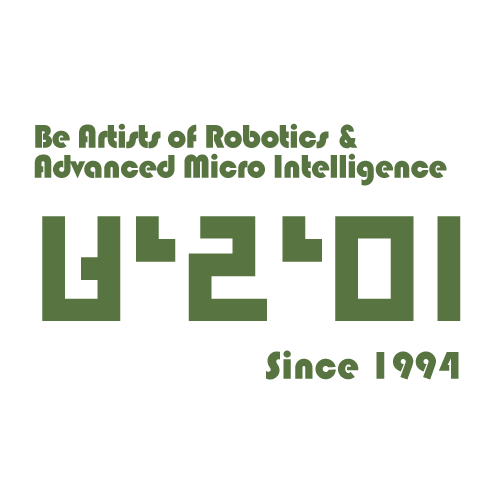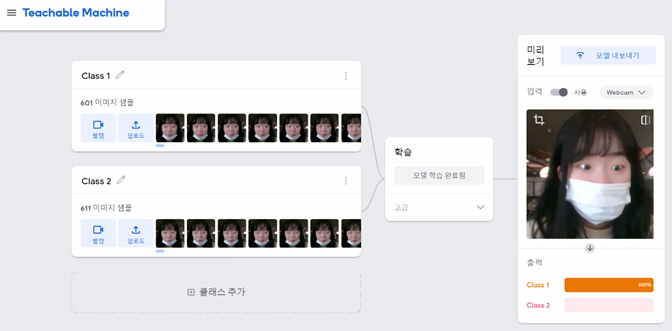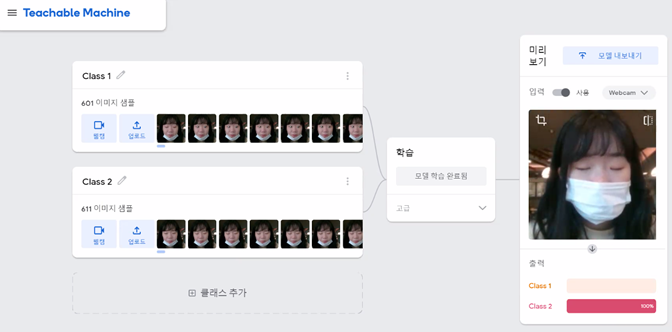Sleepy driving prevention system
티쳐블 머신을 이용해 눈깜빡임 감지 시스템 생성
눈을 떴을 때
눈을 감았을 때
openCV를 이용한 눈깜빡임 감지 시스템
1
2
3
4
5
6
7
8
9
10
11
12
13
14
15
16
17
18
19
20
21
22
23
24
25
26
27
28
29
30
31
32
33
34
35
36
37
38
39
40
41
42
43
44
45
46
47
48
49
50
51
52
53
54
55
56
57
58
59
60
61
62
63
64
65
66
67
68
69
70
71
72
73
74
75
76
77
78
import cv2
import os
import numpy as np
from keras.preprocessing.image import img_to_array
from keras.models import load_model
from scipy import io
sleep_classifier = []
for file in files:
if '.png' in files:
f = cv2.imread(file)
sleep_classifier.append(f)
# Face detection XML load and trained model loading
sleep_detection = cv2.CascadeClassifier('haarcascade_eye.xml')
sleep_classifier = image.load_model('주소')
STATES = ["Sleepy" ,"Non-sleepy"]
# Video capture using webcam
camera = cv2.VideoCapture(0)
while True:
# Capture image from camera
ret, frame = camera.read()
# Convert color to gray scale
gray = cv2.cvtColor(frame, cv2.COLOR_BGR2GRAY)
# Face detection in frame
sleeps = sleep_detection.detectMultiScale(gray,
scaleFactor=1.1,
minNeighbors=5,
minSize=(30,30))
# Create empty image
canvas = np.zeros((250, 300, 3), dtype="uint8")
# Perform drowsy driving recognition only when face is detected
if len(sleeps) > 0:
# For the largest image
sleep = sorted(sleeps, reverse=True, key=lambda x: (x[2] - x[0]) * (x[3] - x[1]))[0]
(fX, fY, fW, fH) = sleep
# Resize the image to 48x48 for neural network
roi = gray[fY:fY + fH, fX:fX + fW]
roi = cv2.resize(roi, (48, 48))
roi = roi.astype("float") / 255.0
roi = img_to_array(roi)
roi = np.expand_dims(roi, axis=0)
# Blinking predict
preds = sleep_classifier.predict(roi)[0]
blinking_probability = np.max(preds)
label = STATES[preds.argmax()]
# Assign labeling
cv2.putText(frame, label, (fX, fY - 10), cv2.FONT_HERSHEY_SIMPLEX, 0.45, (0, 0, 255), 2)
cv2.rectangle(frame, (fX, fY), (fX + fW, fY + fH), (0, 0, 255), 2)
# Label printing
for (i, (blinking, prob)) in enumerate(zip(STATES, preds)):
text = "{}: {:.2f}%".format(blinking, prob * 100)
w = int(prob * 300)
cv2.rectangle(canvas, (7, (i * 35) + 5), (w, (i * 35) + 35), (0, 0, 255), -1)
cv2.putText(canvas, text, (10, (i * 35) + 23), cv2.FONT_HERSHEY_SIMPLEX, 0.45, (255, 255, 255), 2)
# Open two windows
## Display image ("Drowsy driving recognitionf")
## Display probabilities of blinking
cv2.imshow('Drowsy driving recognition', frame)
cv2.imshow("Probabilities", canvas)
# q to quit
if cv2.waitKey(1) & 0xFF == ord('q'):
break
# Clear program and close windows
camera.release()
cv2.destroyAllWindows()
: 데이터를 로드하는 과정은 생략하였다.
데이터 출처 : MRL Eye Dataset

보완할 점
: 코드에 대한 부분적인 수정이 필요함 (인지 부위를 눈으로 설정한다면 좀 더 효과적으로 졸음으로 인한 눈 blinking을 확인할 수 있을 것이라 생각했다. 하지만 이 부분을 코드로 바꾸는 데에 약간의 어려움이 있어, 얼굴 전체를 인식해 eye blinking 등을 구분해주는 기능까지 구현해보았다.)


